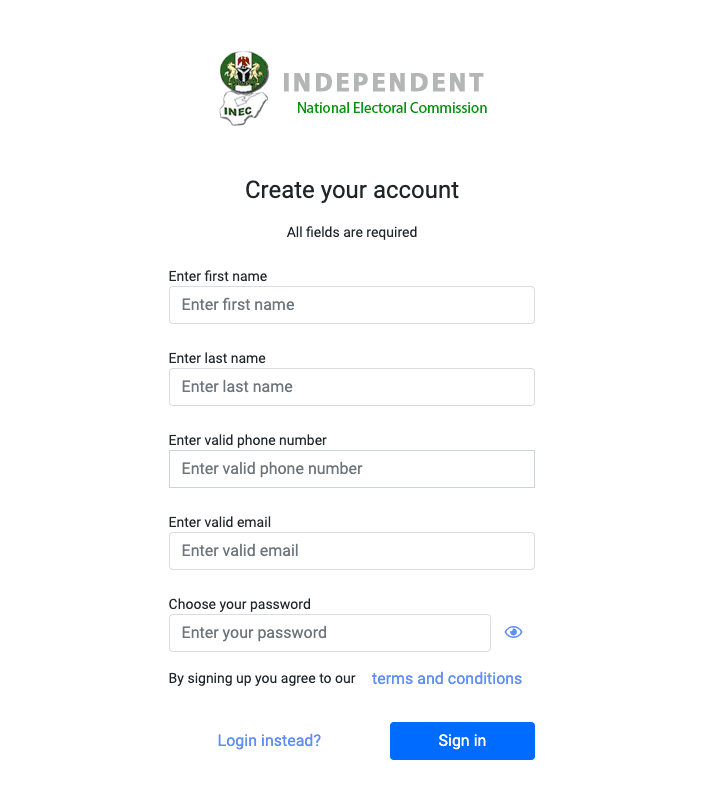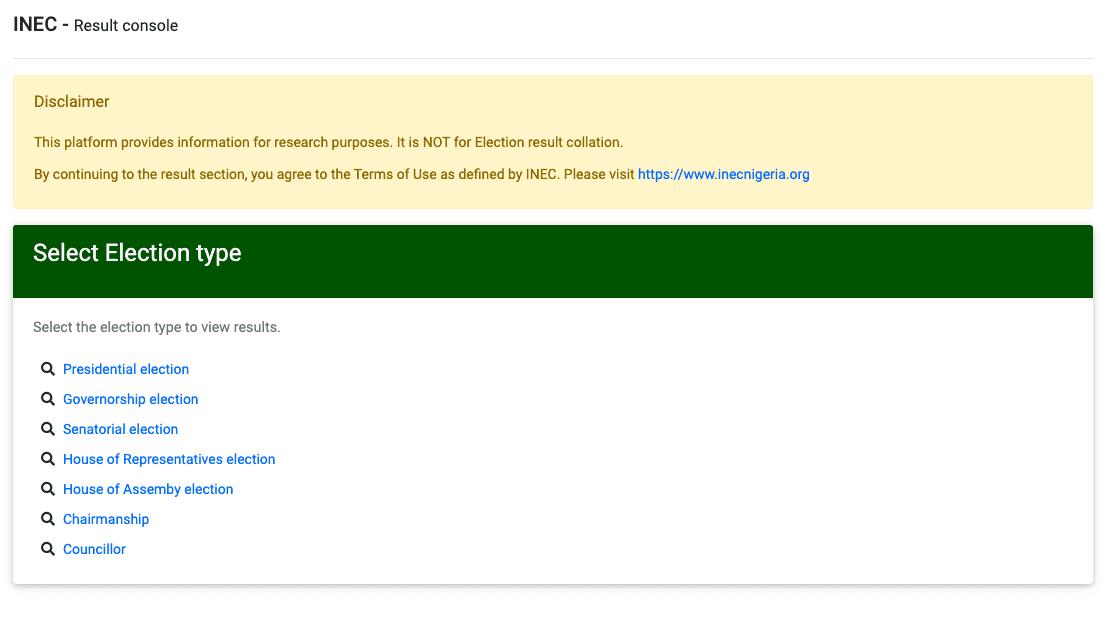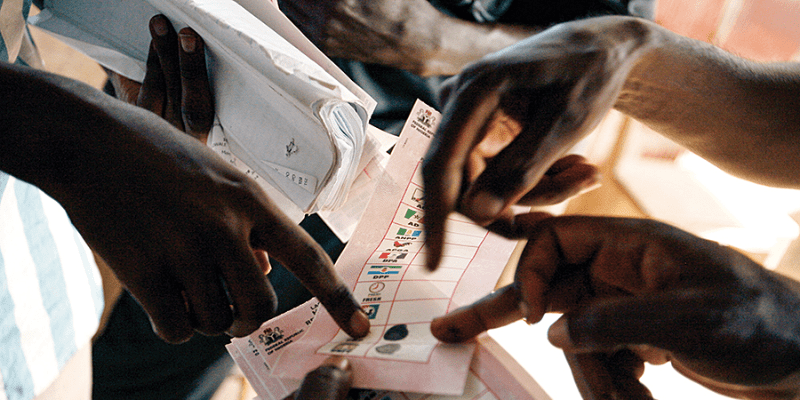IRev: The 2023 presidential election will hold on Saturday, and the candidates are wrapping up their campaigns. Ahead of the polls, Nigerians must understand precisely how the electoral voting process will work so they can participate in the process of watching the election results.
The Independent National Electoral Commission has explained the voting process over time, what to anticipate, and how citizens can determine whether it is free and fair through the INEC Result Viewing Portal (IReV).
According to an INEC statement about IReV, the electoral referee aims to find ways to use technology to improve the credibility of elections and ensure the safety of citizens participating in the electoral process.
“Over the last three electoral cycles, the Independent National Electoral Commission (INEC) has consistently sought to apply technology to improve the credibility and safety of the electoral process in Nigeria.”
“This has recently intensified with the threat to public safety posed by the COVID-19 pandemic, which has necessitated an inevitable quantum rise in remote, rather than direct and physical interactions in the electoral process.”
This will work hand in hand with the Bimodal Verification Accreditation System tool. After the accreditation process and the voting has ended, the BVAS will snap the compilation of the votes and upload it on the IReV portal. It will be done in all the polling units in 36 states.
But how does the INEC Result Viewing Portal works?
Creating an account on INEC Result Viewing Portal (IReV) to monitor election results
Signing up

You must have an account on the INEC result viewing portal before you can verify the election results. It’s fairly simple to register. Basic contact details and a working email are all that is required. An account activation email is sent to the email address provided in the form.
After signing up
Once the activation code is input into the website, It automatically logs you into the portal. This election viewing portal is not only for the presidential elections. There are different election types on the first page, from the Presidential Election to Councillor Election.

Monitor the election results through the INEC Result Viewing Portal (IReV)
You can select the Election type you wish to see the results, and on the next page, it shows you the election results in the case of the upcoming presidential election, in the different states and the time results were last uploaded.
Click it to narrow your search to a particular state. The next page has two side-by-side sections. The statistics for the results, the overall number of results submitted, and a refresh button are all displayed on the left.
The middle section will show you all the LGA in that state and how many wards each has. You can also keep track of the number of polling units from each ward and LGA that have submitted their results.
By selecting the Visit Ward option next to each LGA, you can choose to keep an even closer eye on certain areas. You are then directed to another page where you can now keep track of the results updates for each polling unit.
The Bimodal Voters Accreditation System tool uploads the results papers in PDF format to the website. INEC will now use the results from all LGAs and states to declare the victor of the presidential election after all polling units have submitted their online election result sheets.
Nigerians will be hoping for a very smooth, free, and fair election when they go to their polling units to cast their votes in the coming days.
This is the first general election that would be held since the provisions of Sections 47 and 50 (2) of the Electoral Act 2022, which support the Independent National Electoral Commission’s (INEC) use of smart card readers, electronic voter accreditation, and any other voter accreditation technology INEC deploys.
The use of technology also makes it easier for Nigerians to recognize and address several problems with polling units, the transmission of results, and result viewing—all of which have plagued previous elections.
All of these have added to the excitement ahead of the weekend when Nigerians will go to the polls to select individuals that will administer the nation’s affairs for the next four years.
In the build-up to the election, there have been so many discussions, conversations and dialogues about whom the best candidates are and what they offer in terms of competencies and capabilities in solving the many challenges currently bedevilling the nation.
However, one of the many challenges that voters are likely to encounter on election day and throughout the voting process is proper knowledge and awareness of how to access some of the many vital information that is readily available to them.
One of these many issues is accessing your polling units on time or perhaps even knowing where the right ones are. This issue is prevalent in cases where many voters forget their registration centres or have their polling units in states in which they do not reside.
Many individuals may have registered in locations they do not reside so Nigerians may be travelling between states and find themselves confused as to where their polling units are located.
This article will help registered voters identify and find their polling units easily and seamlessly. According to research, two easy ways exist to access and know your INEC-designated polling unit, in case you do not know the right location to cast your vote.
How to know your Polling unit
According to the statement released on the 17th of February by the INEC Chairman, Prof. Mahmood Yakubu, “in order to ease the process, the Commission is sending out bulk phone text messages (SMS) to citizens voting in new polling units. Similarly, the register of such voters for each state has been sent to all the Resident Electoral Commissioners for publicity, particularly through messages in local languages.”
Furthermore, the Commission offers voters the option to receive a text message (SMS) detailing the location of their specific polling unit or by checking on the INEC portal using their names and dates of birth.
For a step-by-step process on how to inquire about your PUs, do one of the following:
Via SMS
Direct text messages are one way Nigerians communicate daily, with or without smartphones. With the rise in mobile adoption and the use of smartphones in Africa, particularly in Nigeria, sending SMS shouldn’t be much of a problem for everybody, including those in rural areas.
In this regard, INEC has made it easier for Nigerians to access their polling units by sending a text containing vital voter information to the commission.
To confirm your polling unit, all that is to be done by the voter is text the name of their state, last name, and the last six digits of your Voter Identification Number (VIN) to either of these numbers; 09062830860 or 09062830861
Via INEC website
Another easy way to verify your polling unit is through the INEC website. This can be completed with a computer or a smartphone with an internet connection.
Visit INEC’s website at www.voters.inecnigeria.org or www.cvr.inecnigeria.org/vvs
Fill in the State and Local government area of registration, last name, first name and date of birth
Click on Get Directions
As a voter, for your safety and to ensure that you exercise your right and responsibility to vote and be elected, make sure you go to your polling units with a valid voter’s card, obey the law, and refrain from any acts of violence that might result from needless conflict and disagreement with people who hold different political opinions and views.


